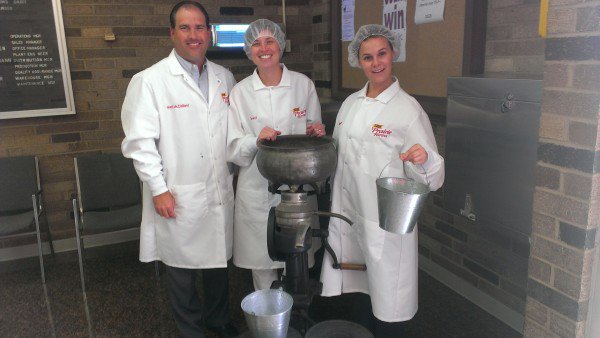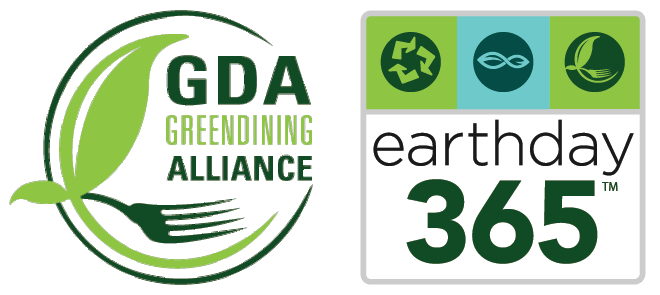Written and published August 2013 by Olivia Engel, Green Dining Alliance Program Coordinator
This Wednesday, Cassandra Hage and Olivia Engel, Executive Director of St. Louis Earth Day and the new GDA Coordinator, embarked on a journey to Hazelwood to learn more about the operations of Prairie Farms.
The two were given an extensive tour of the dairy’s facilities.
Wait… Prairie Farms is “local?”
When Cassandra found out that Prairie Farms was not only a farmers’ collective (owned by over 700 farming families), but that the company also sources all of its milk regionally, they decided to investigate.
During their visit, Cassandra and Olivia learned that the milk reaches the Hazelwood facility within 24 hours of leaving each farm, all of which are located within 250 miles of Hazelwood. Prairie Farms explained that they have always operated this way, because fresh milk tastes better.
Milk from healthy, comfortable cows tastes better, too, which is why the farmers in the collective are guided by F.A.R.M. standards for animal welfare and receive regular audits and check-ups.

Matt of Prairie Farms, Cassandra and Olivia at their Hazelwood facility, with a nineteenth century butter churner!
Steps Toward Sustainability
Prairie Farms is focused on advancing their environmental stewardship and operational efficiency. According to their sustainability page, contributing farmers compost their cows’ manure or use dried patties for animal bedding, reducing the need for chemical fertilizers and easing stress on cows’ joints. They also have volunteered to work with the dairy industry to reduce their carbon footprint by 25% by 2020. Read more about their sustainability commitment online from the Prairie Farms website.
“Why use three trucks when we can use one?” – Matt McClelland (St. Louis Director of Operations, Prairie Farms) on rethinking and reorganizing shipments
When we hear a large, successful company say that quality, stewardship and animal welfare are important to them – especially one that processes thousands of gallons of milk a day – we have to cheer. Prairie Farms has been supplying the USA with milk for 75 years, and while they know how to keep their heartland farmer values in the forefront, they also know how to listen and adapt. When it became clear in 2008 that the majority of their customers did not want milk from cows injected with rBST, they made it a point to reject farmers from the collective if they were using it.
Economy of Scale meets Family Farm Collective
Olivia was interested in the unique hybrid company Prairie Farms has created. It’s a company that seems to bring “mom and pop” heart to large-scale production.
With 700 farmers and relationships with other dairies throughout the Midwest, the company benefits from a distribution of risks. When milk production was low due to drought in 2012, Prairie Farms was able to source it from other supplies who had surplus milk in need of a market. Non-local milk does account for approximately 2-3% of St. Louis’ Prairie Farms products, but this milk would be wasted if not sold through Prairie Farms.
It’s not always hard to buy responsibly
Cassandra and Olivia left Prairie Farms feeling pleased with the knowledge that so many restaurants, individuals and institutions in St. Louis already use a local option for dairy; and after touring the facility, they felt confident in Prairie Farm’s commitment to sustainability goals.


